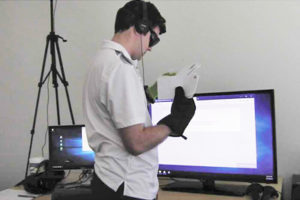Abstract
Strategies used in training future health professionals have expanded from traditional methods to a variety of approaches, including sensitivity training. Students who receive disease-specific sensitivity training are more compassionate to patients. Alzheimer’s disease (AD) sensitivity training includes deficit-focused dementia tours that physically alter sensations. This embedded-experimental (between-subjects) variant mixed-methods study assessed the effectiveness of virtual reality as a delivery format for dementia tours compared to dementia tours that physically alter sensations. It also compared the effectiveness of deficit-focused dementia sensitivity training to reading strengths-focused case studies, a traditional instruction method.
Forty-one university students were randomized into one of three conditions. All participants completed pre- and post-assessments and were interviewed. Quantitative results indicate that a dementia tour offered through virtual reality is as effective as a physical-based tour; however, compared to reading case studies, participants reported poorer attitudes about living with AD and feeling less prepared for caregiving. The qualitative results show an increase in empathy across all conditions. Integration of findings indicates that dementia tours in both formats are effective at encouraging empathy and that both strengths-based and deficit-based sensitivity training are important components of education for future health care workers.


